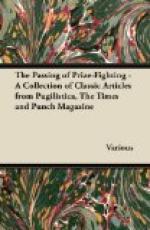Those who have learnt to value their “TAFFRAIL” will find matter very much to their mind in his latest book, A Little Ship (CHAMBERS). I do not wish to institute any invidious comparisons between the marine mixture as provided by “TAFFRAIL” and that of other nautical writers, but this much I may say with perfect confidence: the men to be found in “TAFFRAIL’S” stories are true human stuff, sturdy, dogged in doing their duty, and brave almost beyond recklessness; but they are men all the time, and not solemn and consecrated angels. That is, I suppose, why I find that “TAFFRAIL’S” stories go straight to the mark and make their effect with no undue waste of time; and, if a little bit of laughter is occasionally worked in, so much the better. The last chapter in the book gives an account of the Zeebrugge expedition. The story is so bravely told that a man can hardly refrain from shouting in apprehension and exultation as he reads it.
* * * * *
I have a grudge against the publishers of Miss Mink’s Soldier (HODDER AND STOUGHTON) because they have printed on its wrapper, “By the Author of Mrs. Wiggs of the Cabbage Patch,” which led me, perhaps foolishly, to hope that Mrs. Wiggs and I were to foregather once more, and when we didn’t made me just a little surly towards a book of short tales which, opened with any other expectation, would have seemed much above the average. There are eight stories in the book, and in almost all of them is found that blend of pathos and humour that Mrs. ALICE HEGAN RICE has taught us to expect. I liked “Cupid Goes Slumming,” because it was almost Cabbage Patch; but “Hoodooed,” the story of an old negro who believed himself the victim of a spell which involved the presence of a cricket in his leg, delighted me even more. His wife removes the charm with a vacuum cleaner, in which she has previously secreted a cricket, and the victim recovers. It pleased me very much to learn that among “white folk’s superstitions” is the theory that it is “bad luck to sleep with the windows shet,” and, when I come to think of it, I believe that it is very bad luck indeed.
* * * * *
I should have liked GABRIELLE VALLINGS’ Tumult (HUTCHINSON) a good deal better if she could have managed it without the aid of a Pan who wandered, emitting a strong smell, chiefly in the demesne of a very expensive and over-cultivated French noble. It was his daughter (by an Australian wife) who was suffering from an inordinate perplexity as to which half of her blood had the real call. The Australian half suggested that she should marry a gentleman-rider who won the Grand Prix in a canter, but fell at the winning-post because his horse shied at the irrepressible Pan. The French half—and both her parents—urged a dissolute and anaemic aristocrat—blue blood and a gold lining. Her grandfather, a strong unsilent sheep-rancher, was against this inept decadent




